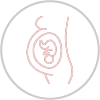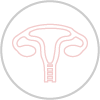Urinary Incontinence is surprisingly common. The Bladder & Bowel Foundation estimate that one in four of us will have a problem with bladder control at some time of our lives. The NHS estimates that between 6-8 million people in the UK currently have some degree of urinary incontinence.
Incontinence can have a major impact on your quality of life. The good thing to know is that it is a manageable and treatable condition. You really don’t have to suffer in silence.
Urinary Incontinence is a term that describes any accidental or involuntary loss of urine from the bladder. It is commonly associated with pregnancy, childbirth, surgery, menopause, obesity and a range of chronic conditions such as bronchitis, diabetes and spinal/nerve problems.
There are different types of incontinence with a number of possible causes. The most common being stress incontinence and urge incontinence.
Stress urinary incontinence (SUI) is defined as the sudden unintentional loss of urine during normal day to day activities. You hear it commonly referred to as having a ‘weak bladder’. It is estimated that approximately one third of women in the UK suffer from SUI. If you suffer with a weak bladder you may notice leakage if you laugh, cough, sneeze, exercise, change positions or lift something heavy. It can also be associated with obesity, having a chronic cough or diabetes. So have you ever wondered why this may be the case? Have you lived with this assuming that it is ‘normal for a woman’, ‘all part of ageing’, ‘it’s what women have to put up with after childbirth’? I can tell you it is indeed common, but it certainly isn’t ‘normal’ or something that you have to accept and live with.
These above situations are all activities that increase pressure inside your abdomen, thus forcing pressure down onto your bladder, womb, bowel (your pelvic organs) and the layers of pelvic floor muscles beneath. Pregnancy; (weight of baby, natural hormonal changes) childbirth; (especially prolonged deliveries, forceps/suction assisted deliveries, episiotomies, larger babies), surgery; (C-Sections, hysterectomies, prolapse repairs), chronic constipation, an increased BMI and other trauma can stretch, damage and weaken the pelvic floor muscles that support your pelvic organs and their associated tubes/passages. Under this stress, your pelvic floor muscles and bladder sphincters are too weak and therefore do not work properly or react quickly enough to stop the burst of urine, hence your wetness. Strong, healthy and well contracted pelvic floor muscles act like a taut trampoline and provide lift to your pelvic organs and, along with the sphincters help to keep the openings of the urethra, vagina and anus shut thus preventing leakage.
During menopause, certain times of the menstrual cycle, or after some gynaecological surgeries, the pelvic floor becomes weaker, following hormonal changes within the body. Oestrogen (a female hormone) is produced in lower quantities or stopped completely. Oestrogen helps to maintain the thickness of the lining of the urethra, to keep the urethra sealed after passing urine (much like a washer seals water from leaking in a tap). For some women this loss of oestrogen causes SUI.
Your pelvic floor muscle health & strength, and indeed your buttocks and abdominals, play a fundamental role in controlling and maintaining your continence. Through seeing a Specialist Physiotherapist, and along with your GP, we can help you along the right course of treatment depending on the problem. The pelvic floor muscle is a group of muscles like all other muscles in your body – it needs specific training to activate, strengthen and be ‘fit-for-purpose’.
I can guide you on where to start, what to do, how to do it, on what treatment entails and I can support you through your journey.
Physiotherapy for SUI:
- In depth assessment of gynaecological and obstetric history and current symptoms
- Physical examination and internal assessment (with consent)
- Teaching correct and effective pelvic floor muscle exercises
- Teaching abdominal exercises and buttock exercises
- Advice on healthy weight loss program, increased fitness program
- Advice on lifestyle: activity modification, exercise, bladder training
- Bladder training techniques
- Discussion of medication, liaison with GP



